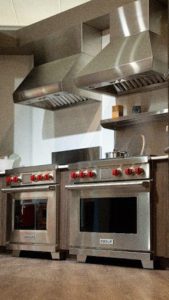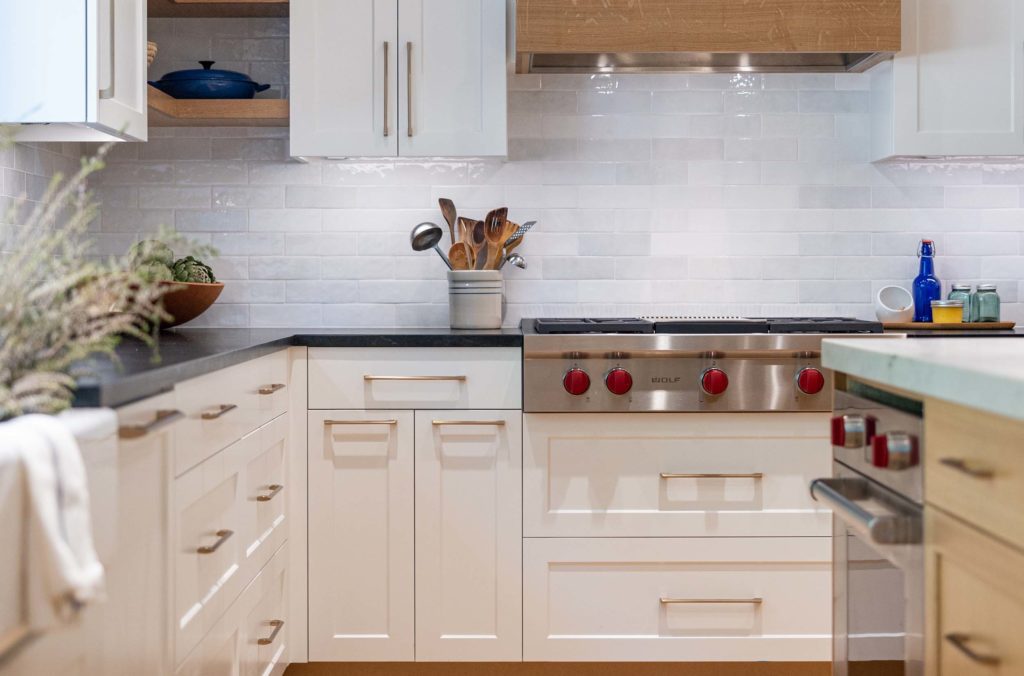 Choosing appliances for your new home or remodel can be a daunting task, considering the myriad of brands, sizes, styles, energy ratings, and pricing. Salespeople may try to upsell you on models or styles you don’t necessarily need (or want), or that don’t truly work for your space, so it’s critical to be informed on what is out there so you’re not taken by surprise.
Choosing appliances for your new home or remodel can be a daunting task, considering the myriad of brands, sizes, styles, energy ratings, and pricing. Salespeople may try to upsell you on models or styles you don’t necessarily need (or want), or that don’t truly work for your space, so it’s critical to be informed on what is out there so you’re not taken by surprise.
We asked Aaron Nevel, appliance specialist and Account Manager with Basco Appliances in Lake Oswego for the best tips on how to make the right decision on appliances.
- Know how you cook. Before you start looking for kitchen appliances, Aaron recommends figuring out your current cooking style or what type of cooking you would like to do in your new kitchen. Are you comfortable with electric cooktops or gas? Do you prefer a built-in refrigerator or a free-standing unit? “Knowing how you want to cook before you shop will help navigate before going through any pitfalls,” Aaron explains.
- Ask a local specialist. If you’re leery about a brand for any reason, (for example, LG is well-known for TV’s, but also makes appliances), call a local service or repair technician and ask them if they work on those brands, what they think about them, and if they can get parts on them. “Repair technicians can also tell you if they’ve seen a history of issues with any specific brand that can be insightful,” Aaron said.
 Energy efficiency. Different brands and sizes often determine the variance of energy efficiency, and therefore price. The goal is to use less water, less electricity, and be “green” (from gas to induction for example). Efficiency also means less gas burn-off and easier to clean. Aaron recommends looking at the rating of the product and the life span. For example, SubZero has a two-compressor design allowing for more energy-efficient temperature control in each portion of the fridge. This gives it a longer life span than a free-standing refrigerator, but as such, they are higher-priced. “A free-standing fridge should last about 7 to 9 years and built-in’s last about 20 to 30 years,” Aaron notes.
Energy efficiency. Different brands and sizes often determine the variance of energy efficiency, and therefore price. The goal is to use less water, less electricity, and be “green” (from gas to induction for example). Efficiency also means less gas burn-off and easier to clean. Aaron recommends looking at the rating of the product and the life span. For example, SubZero has a two-compressor design allowing for more energy-efficient temperature control in each portion of the fridge. This gives it a longer life span than a free-standing refrigerator, but as such, they are higher-priced. “A free-standing fridge should last about 7 to 9 years and built-in’s last about 20 to 30 years,” Aaron notes.
 Measure. Make sure you know the measurements for where your appliances are going to be installed. Getting a refrigerator that is too big for the allotted space will prove frustrating when the doors won’t open all the way, or the top doesn’t fit during installation because of upper cabinets. Aaron suggests making sure that you are at least 4-6” from a wall. “A standard size refrigerator is 36” by 72” now,” Aaron says. “So if you’re in an older house, measure first and take pictures of your kitchen to bring into your sales or design team and they can help create the space.” The same advice goes for dishwashers, microwaves, washers and dryers, cook tops or oven installs.
Measure. Make sure you know the measurements for where your appliances are going to be installed. Getting a refrigerator that is too big for the allotted space will prove frustrating when the doors won’t open all the way, or the top doesn’t fit during installation because of upper cabinets. Aaron suggests making sure that you are at least 4-6” from a wall. “A standard size refrigerator is 36” by 72” now,” Aaron says. “So if you’re in an older house, measure first and take pictures of your kitchen to bring into your sales or design team and they can help create the space.” The same advice goes for dishwashers, microwaves, washers and dryers, cook tops or oven installs.
- Style and function. Style is the “feel” of your kitchen, which ultimately dictates the price point. Do you want flush-mount or free-standing? Does the unit have handles that will stick out into the walking space? Will the dishwasher door bump into the refrigerator door if both are open? These are the everyday details one should consider before purchasing. “Also be familiar with the process of the building schedule also to account for supply chain and timing constraints,” Aaron suggests. “Timing is everything, so plan ahead to adapt if something does change in the market. The more time you can give your team, the smoother the process will be.”
 A note about consumer reports. Be cautious of some consumer report resources where featured brands participate via “pay-to-play” incentives, where the higher payer often receives the higher accolades. Refer to an independent, third-party source like JD Power or AJ Madison are a good resource to find bulk info, but does not do independent research, so their reviews are just from the manufacturer. “The manufacturer sites are great resources as well,” says Aaron.
A note about consumer reports. Be cautious of some consumer report resources where featured brands participate via “pay-to-play” incentives, where the higher payer often receives the higher accolades. Refer to an independent, third-party source like JD Power or AJ Madison are a good resource to find bulk info, but does not do independent research, so their reviews are just from the manufacturer. “The manufacturer sites are great resources as well,” says Aaron.
Knowledge is power, especially in the buying process. Do your homework now so you can make your purchases as soon as you are ready, and make sure the person who helps you select appliances is an expert with plenty of experience in the field. These tips will help your design and construction teams adequately prepare for your project, which will save you unexpected headaches or delays down the road.
Contact us today to learn more about how we can help you accomplish your vision for your home!

